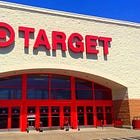It's Only A Flesh Wound: Target Keeps Hemorrhaging As Blowback From Ditching 'DEI' Continues
Its stock has dropped, foot traffic is down, and the boycott is going strong.

I haven’t bought a single thing at Target since before January 24, when they announced that they would be rolling back their “DEI” (diversity, equity, and inclusion) efforts in advance of expected segregationist changes to the cultural zeitgeist. (Your mandatory reminder: “anti-DEI” is the new rightwing shorthand for Black people and gay people and women shouldn’t exist outside the home in our society, and hiring them means you’ve probably discriminated against a white man.) This has been no small sacrifice, because they do have a trail mix I’m particularly fond of, as well as a wide array of cute tights and fishnets that have long been a cornerstone of my largely pants-free lifestyle.
I’m far from alone. The big box retailer’s stock fell to a four-year low of $88.76 a share earlier this month (down from a high of $266.38 a share on November 15, 2021), and in-store foot traffic has been decreasing every week for the last 10 weeks — likely due to both the official Lenten boycott led by Black pastors … as well as just giving their usual customers the ick.
One could chalk this all up to people being more circumspect about their purchases in light of the whole tariffs situation were it not for the fact that Costco is killing it.
Stock for Costco, which bucked the trend and very publicly vowed to hold onto their DEI initiatives, actually hit a four-year high of $968.99 on February 12 — and, as of April 4, their foot traffic had increased for 13 straight weeks. Customers have made it very clear that they don’t want to shop at places that see diversity as a “trend” that they can follow when the wind blows one way and drop as soon as it seems to blow another way. They had already buckled under to demands that they stop selling Pride merch back in 2023 — it was a whole thing! Now informing their Black customers that they’re too scared to maintain a diverse workplace that looks like their customers — that looks like America — is just an extra insult.
Another blow to Target came this month as Ulta CEO Kecia Steelman announced that they would be hitting the pause button on plans to add more of their shop-within-a-shops to Target stores. This was framed as wanting to focus on the 610 mini-Ultas in Target stores across the country, but given that Steelman didn’t even acknowledge the partnership on her first earnings call as CEO, it does seem as though the enthusiasm for the idea is cooling.
Does this have something to do with DEI? Well, they haven’t said so, but it wouldn’t be surprising if it did. Unlike Target, the company has maintained its DEI standards, which is not exactly surprising given that they are a beauty company — and, laugh if you want, but people are unusually well informed about which brands, brand owners/figureheads, companies, and influencers are problematic, and if someone or some entity screws up, it’s not going to be swept under the rug. For instance, at least half of the reviews I’ve seen for the new Givenchy Prisme Libre bronzers are about how the shade range they released is only suitable for white people, and how that is no longer acceptable.
While lots of companies have rolled back DEI initiatives in recent months in order to appease the administration, Target seems to have had the biggest blowback. This is, in part, because it was previously perceived as being a more progressive option than Walmart, but also because for a lot of that demographic, not shopping there is, at most, a minor inconvenience but an easy thing to focus on. I can find tights elsewhere and I don’t really need peanut butter chocolate “trail mix” that, let’s be real, is just candy. There’s also the public factor. People don’t want to be seen going into Target, carrying bags from Target or having Target delivered to their homes.
I don’t actually know if Target can recover from this, if their customer base would return if they recommitted themselves to opposing segregation — people have short memories, but once they get skeeved, it’s hard to go back.




I love shopping at Costco. Friendly, helpful employees there. But the quantities are daunting for tiny households. I recommend shopping with other family units and splitting purchases.
Way to understand your market, Target.